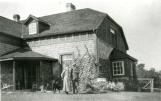1
Around 1890, Charles and Alice Westhead, of England, came for a visit to the Goddard Horse Ranch near Calgary.Valentine Neis, who was working on the ranch, told them of the rich farmland near Buffalo Lake.
Two years later, Charles Westhead took a military homestead on the west side of Parlby Creek, just SW of Buffalo Lake, and south of Spotted Lake and established a cattle and horse ranch there.
His wife, Alice was the first white woman to arrive in this area. She was an exceptional horsewoman, and an excellent hostess at the many social events held at her home.
3
The Westhead's in front of their home.Many of our early settlers came here from Eastern Canada, the United States or the British Isles.
After arriving in 1892, Charles and Alice built this large ranchhouse on Prospect Hill, close to Alix, a few kilometers from where Mirror eventually was built.
This area, southwest of Buffalo Lake, was home to many of the folks who had come from Britain, and they tended to group together for social activities.
The Westhead home became a centre for much of this activity, and if some event wasn't actually 'held' at the Westhead's, it had often been planned there.
Being mainly from British heritage, these settlers brought with them familiar sports and activities such as horse racing, coyote (instead of fox) hunts, clay-bird shoots, steeplechases and polo matches.
Race tracks were at the Goater's place, West of Lamerton. They had coyote hunts and clay-bird shoots twice a week, and Jim Brindle's horse, Badger, won several steeplechases in Calgary before it died of swamp fever.
They organized a polo club, playing on Saturday afternoons at both the Westhead and the Hickling ranches on Haunted Lake (a few km SW of Buffalo Lake), and at the Parlby ranch just west of there. Once in awhile they loaded their ponies on a cattle car, going as far as Calgary or Millarville to play, and their polo team actually beat Calgary.
A team composed of W. Parlby, William Trevenen, Charlie Jamieson and Louis Mott competed in a four way polo tournament in Edmonton, which was put on before Sir Wilfrid Laurier on Inauguration Day, September 1, 1905, against teams from Edmonton, Calgary and Cochrane.
Edward Goater, and several of the other area ranchers raised polo ponies and race horses for their polo matches, gymkhanas and for hunting.
Charles is listed as a founding member of the Lamerton Gun Club in 1895.
He left for the Boer War in 1899, leaving his wife, Alice, to manage the ranch in his absence. The town of Alix was named for Alice (her maiden name).
